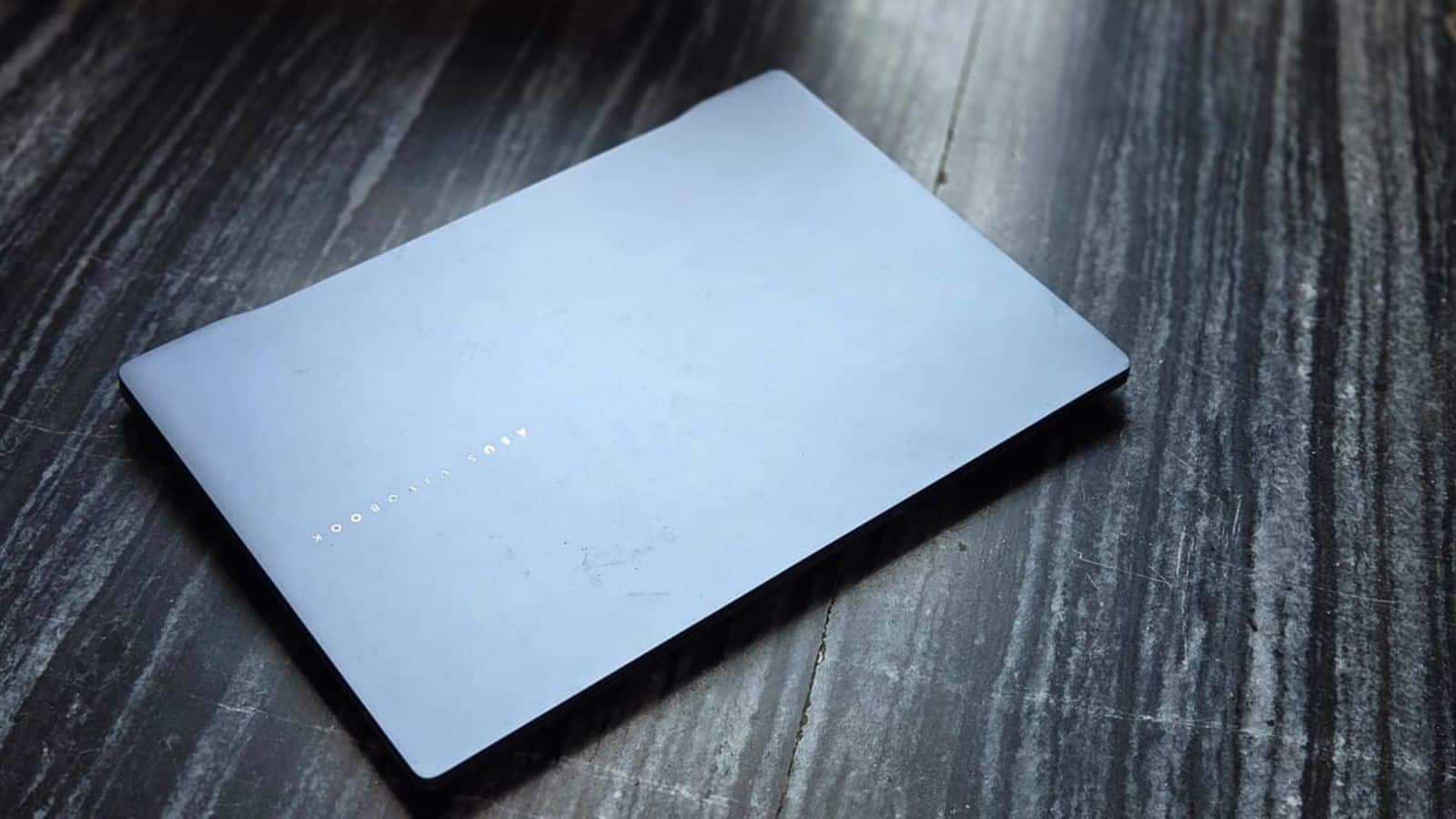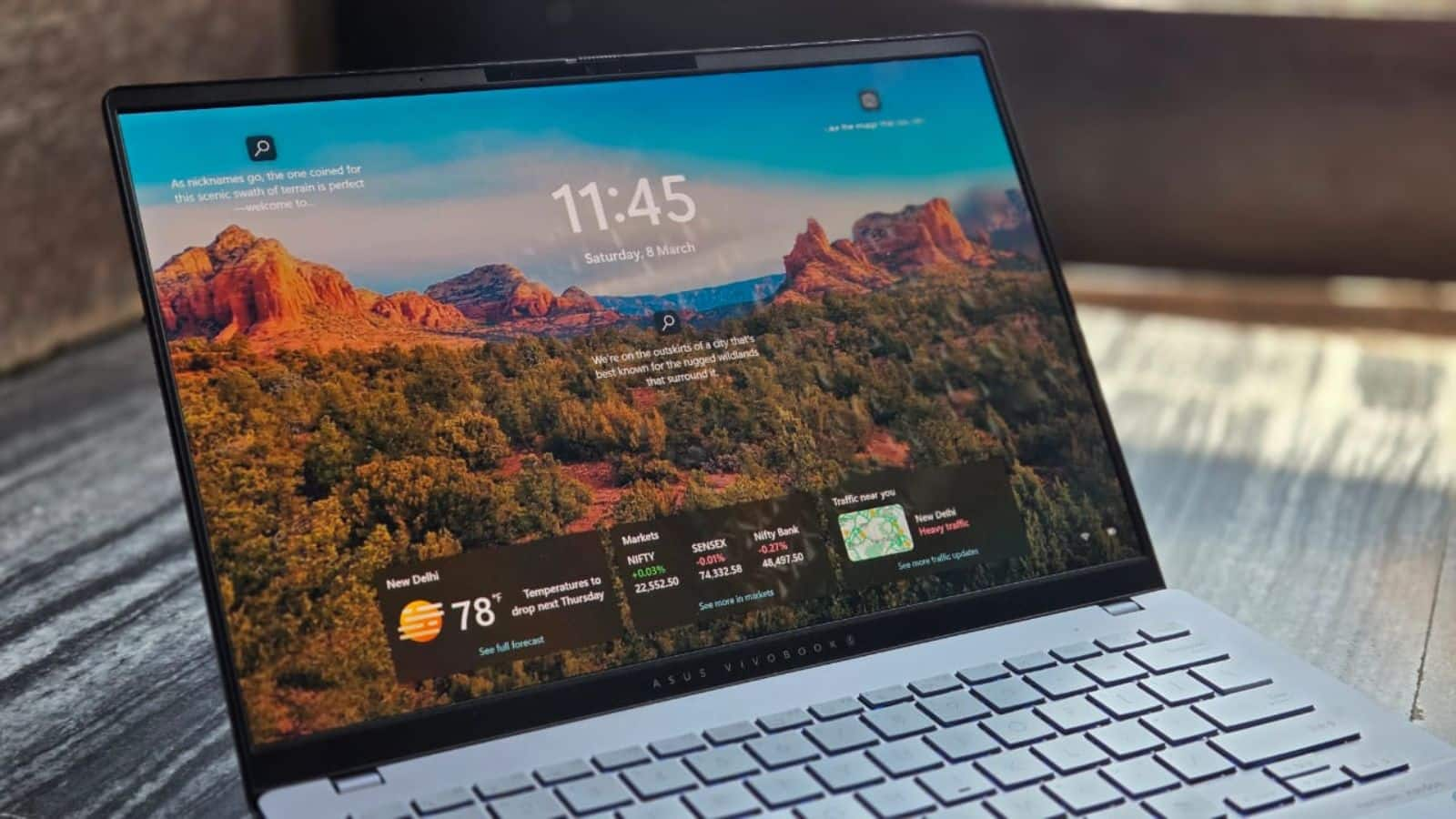



Let’s be real — PC makers might not say it out loud, but when it comes to thin and light laptops, there’s one name that inevitably “enters the chat”: the MacBook Air. Buyers know it. Sellers know it. Even that one guy still clinging to his chunky old laptop knows it.
Apple has turned the art of balancing portability and performance into something of a flex, leaving competitors both inspired and slightly envious.
It’s hard not to get swayed by the appeal of thin laptops. There have been laptops by the dime and dozen that prioritise portability at the expense of performance. As a reviewer, I’ve seen powerful machines that weigh you down — physically, financially, and metaphorically. The Asus Vivobook S 14 is a bit different in that sense. It seems to strike a fine balance between the two.
At first glance, the Vivobook S 14 OLED doesn’t scream “premium” the way some higher-end Asus Zenbooks or Dell XPS models do, but once I picked it up and started using it, I realized this is a machine is more suited for real-world usability rather than just looking good on a spec sheet. It’s light enough to carry around all day without a second thought, yet it packs Intel’s latest Core Ultra processor and a gorgeous OLED display. But how does that translate to real-world performance? Let’s dive in.
Design and build qualityThe moment you unbox this machine, the premium feel was obvious. The aluminum alloy chassis gives it a solid yet lightweight construction, and the new Asus Vivobook logo on the lid has a nice subtle engraving. It’s clean, minimalistic, and looks great in the Mist blue colour variant — our review unit.
 Asus laptop
Asus laptopThe best thing about its laptop is its portability, it weighs only 1.3 kgs, which is almost similar to the MacBook Air M1. I carried it to the office every day in my backpack and never felt weighed down, which is something that usually happens with most laptops. They tend to strain your shoulders, but thankfully, my experience with the Vivobook S14 was comfortable.
The laptop also comes with a 180-degree hinge. I didn’t think the hinge would matter much, but it actually came in handy. Whether I was casually browsing or adjusting my screen for better viewing angles, it made a difference. The MIL-STD-810H certification is reassuring too—I haven’t dropped it (yet), but it feels like it can handle everyday bumps without an issue.
DisplayOLED screens are becoming more common in laptops, but this one still surprised me. The 14-inch WUXGA (1920x1200) OLED panel is just stunning. The colors are vivid, the blacks are deep, and at 600 nits of brightness, it’s great even in bright settings. Watching a few Netflix series didn’t put any fatigue on the eyes, and truth be told, it felt more immersive than any regular IPS display.
 Asus laptop
Asus laptopOne thing I really liked was how it maintains color accuracy even at lower brightness levels. I usually work in dim lighting in the evenings, and unlike LCDs that tend to wash out, this one keeps colors punchy without straining my eyes. Asus also claims it emits less blue light, which might explain why I didn’t get the usual eye fatigue after a long work session.
Performance and batteryUnder the hood, the Intel Core Ultra 7 256V processor, paired with 16GB of LPDDR5X RAM and a 512GB PCIe 4.0 SSD, makes everyday tasks effortless. Having used it as my daily driver, it was on for 8 to 9 hours everyday with multiple tabs open, running Slack continuously — it never stuttered. There was some light photo editing, streaming of videos on YouTube and no lags here either. Most importantly, not even once did it heat up.
One of the concerns with thin laptops is heat management, but ASUS seems to have done a good job here. The dual-fan IceCool thermal system kept things cool even when I pushed the laptop with some heavier workloads. It does get slightly warm, but never to an uncomfortable level.
 Asus
AsusI also tried some light video editing as well, and while it handled basic tasks well, it’s not built for heavy-duty content creation. The integrated Intel Arc graphics are fine for casual gaming, but if you’re looking to play AAA titles, this isn’t the laptop for that.
One of the more interesting additions is the onboard NPU (Neural Processing Unit). While its impact isn’t noticeable in everyday tasks, features like AI-enhanced noise cancellation during calls and background blur in video meetings were quite useful. The AI tools aren’t groundbreaking yet, but they’re definitely a sign of where things are headed.
Battery life is adequate. Asus claims up to 27 hours, but in real-world use—browsing, writing, video calls, and streaming—I got around 8-9 hours, which is still pretty solid for a Windows laptop. I liked how things are changing here.The best part? It charges via USB-C, which means I could easily use my power bank to top it up while traveling.
AI featuresAsus has integrated quite a few AI features, and while they’re nice to have, they didn’t drastically change my workflow. Windows Copilot is still evolving, but AI-powered noise cancellation for calls and the AI webcam effects (eye contact correction, auto-framing) were genuinely useful during video meetings.
Keyboard and touchpadTyping on the keyboard felt great—good key travel and comfortable spacing. The single-zone RGB backlight is a fun addition, though it was mostly kept running on a neutral white setting. There’s also a dedicated Copilot key, but I found myself reaching for the usual shortcuts instead of using it.
 Asus laptop
Asus laptopThe touchpad is large and smooth, making navigation smooth and effortless. The physical click feels satisfying too, which is something I appreciate since I tend to use the touchpad a lot when I’m not docked to an external mouse.
Connectivity and portsAsus has covered all the essentials here. You get a 2x USB 3.2 Type-A, 2x Thunderbolt 4 (perfect for fast data transfer and external displays), 1x HDMI 2.1, 1x 3.5mm combo audio jack and 1x microSD card reader.
The device comes with Wi-Fi 7 support, which ensures future-proof wireless connectivity, and there were zero issues with stability. File transfers over Thunderbolt 4 were lightning-fast, which was great when moving large video files.
VerdictAfter using the ASUS Vivobook S 14 OLED (S5406S) for a while, I’d say it’s a fantastic option for students, professionals, and anyone who wants a well-built, lightweight laptop with an incredible display. The performance is solid for everyday tasks, and while the AI features are nice, they’re not must-haves just yet.
It’s not for gamers or heavy video editors, but if you need a stylish, portable laptop for work, entertainment, and casual multitasking, this one is easy to recommend. The OLED screen alone makes a strong case for it.
Can it work as most people’s daily driver? Absolutely, especially for work and media consumption. Just don’t expect AI to be a game-changer—yet.

Discover the latest Business News, Sensex, and Nifty updates. Obtain Personal Finance insights, tax queries, and expert opinions on Moneycontrol or download the Moneycontrol App to stay updated!
Find the best of Al News in one place, specially curated for you every weekend.
Stay on top of the latest tech trends and biggest startup news.